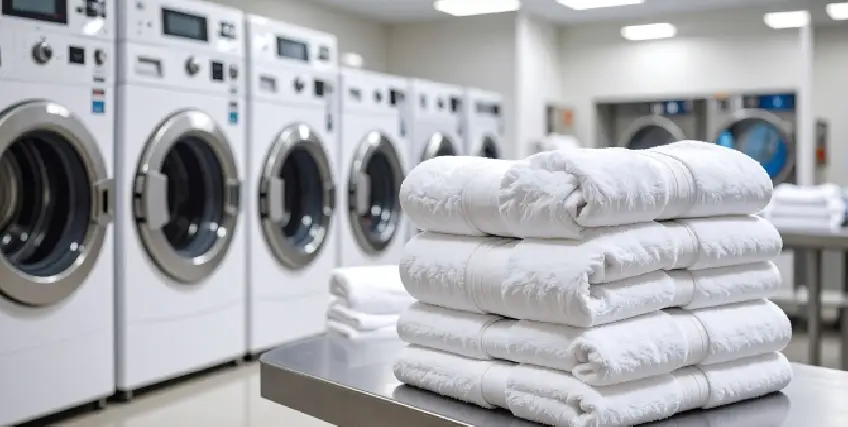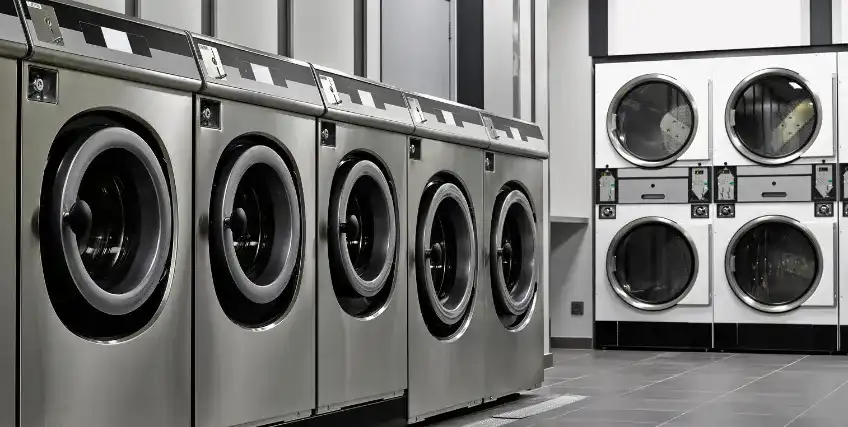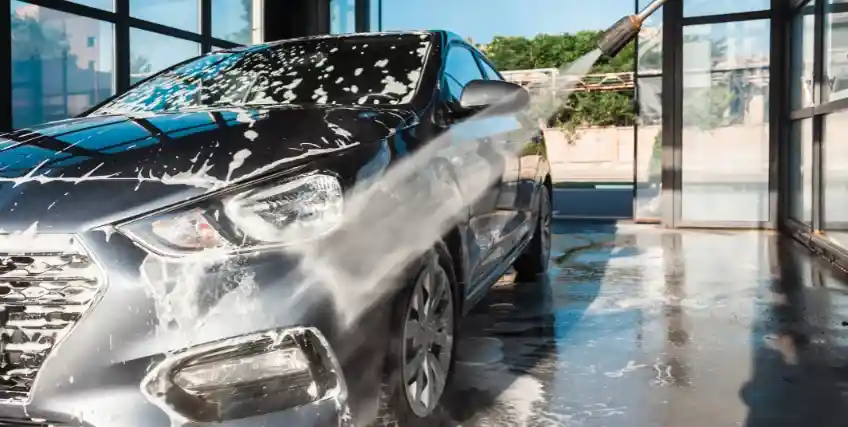Business Real Estate Loan: Why Laundromat Owners Should Consider Buying Their Location
December 25, 2025 | Last Updated on: December 25, 2025

Laundromat owners know one thing for sure - location can make or break the business. But what happens when that perfect spot isn’t yours to keep?
Many laundromat operators rent their storefronts. At first, that may seem cost-effective. But over time, rising rents and lease uncertainties can eat into profits. When landlords change terms or sell, your whole operation is at risk.
This is where a business real estate loan steps in.
With the right loan, laundromat owners can purchase their property instead of leasing it. That means no more unexpected rent hikes, no more moving heavy commercial washers to a new zip code, and no more worrying about lease renewals.
Buying your laundromat space also opens doors to increased equity, better tax deductions, and long-term business growth. You’re not just paying to use a location, you’re investing in a commercial property that adds value to your business.
If you’re already managing the day-to-day operations of a self-service laundry, it might be time to take control of the space itself. And a business real estate loan can help you do just that.
We’ll break down what these loans for laundry businesses are, why they make sense for laundry operators, how to qualify, and the risks to consider, so you can make a smart, informed decision.
Why Owning Your Laundromat’s Location Matters More Than You Think
Laundromats aren’t like cafés or boutiques that can easily move across town. They require heavy machinery, plumbing, and reliable foot traffic. Relocating can be expensive and risky.
That’s why location is everything and why owning it can be a game changer.
When you own the space, you get long-term stability. You’re not at the mercy of a landlord deciding to redevelop or raise rent. You can plan years ahead with confidence.
You also gain more control over your buildout. Want to add more washers? Install newer dryers? Owning your building allows you to renovate without waiting on approvals. That makes business expansion easier and faster.
Customers value consistency. If your laundromat is a staple in the neighborhood, moving could mean losing your loyal base. Owning prevents disruption and keeps your revenue stable.
More importantly, a business real estate loan turns your rental payments into an investment. Instead of throwing money away on rent, you build equity with each monthly payment. And if property values rise, your laundromat location becomes a valuable asset, not just a place to operate.
From improving cash flow to protecting customer relationships, ownership is a strategic move for laundry business owners.
What Is a Business Real Estate Loan?
Buying commercial property for your laundromat isn’t the same as buying a home. A business real estate loan is specifically designed to help business owners purchase or refinance space for commercial use. Here’s what that means in practice.
How Business Real Estate Loans Work
Simply put, with a business real estate loan, borrowers can secure funding to buy or refinance property for commercial usage. Most loans tend to require a down payment, but it depends on the lenders exactly how much they will charge. The remaining balance is paid back over an agreed upon time.
Creditworthiness, annual revenue, cash flow, and the loan-to-value (LTV) ratio determine your eligibility. If you have a strong business banking history and a clear loan application that outlines your business plan, you might be able to have an edge in your application.
Monthly payments include both principal and interest, and some loans also have fees for origination or appraisal.
Types of Business Real Estate Loans
There are a few types of business real estate loan options laundromat owners should consider:
- SBA 504 Loans: Offered through the Small Business Administration. Ideal for buying owner-occupied property. These come with low interest rates and long repayment terms.
- Conventional Commercial Loans: Offered by banks and credit unions. These often require higher credit scores but provide flexibility in terms and rates.
- Commercial Mortgages: Similar to home loans, but for businesses. Monthly payments are typically amortized over 20–25 years, with balloon payments due at the end.
Choosing the right loan program depends on your financials, location, and long-term business goals.
Should You Buy Your Laundromat Location? Pros and Cons
Buying a property with a business real estate loan is a big decision. Sure, it has its risks, but it has its perks too like stability and growth potential to offset long-term responsibility that the loan provides.
Here’s a look at both sides.
Pros of Buying Your Laundromat Property
1. Long-Term Cost Stability
Rent goes up but property payments stay more predictable. With a fixed rate business real estate loan, your monthly payment won’t change dramatically over time. That makes budgeting easier and supports better cash flow planning. It’s especially helpful for laundromats that rely on consistent income to manage overheads and equipment costs.
2. Build Equity Over Time
Each payment you make builds equity. Instead of losing money to rent, you’re investing in a commercial property that increases in value over time. This equity can also be used for refinancing later or as collateral for future business financing like a business line of credit or working capital loan.
3. Greater Control Over Upgrades
When you own the space, you don’t need landlord approvals for renovations or layout changes. Want to expand your dryer section or install smart washers? You can. This flexibility helps you scale your business based on customer demand.
4. Possible Tax Benefits
You may be able to deduct commercial mortgage interest, property taxes, and depreciation. These deductions lower your taxable income and increase profitability. That’s a win for any small business looking to grow while keeping costs low. It is always advised that you consult a tax professional before making any decisions related to taxes.
Cons of Buying Your Laundromat Property
1. High Upfront Costs
You’ll likely need a down payment of 10–25%, along with closing fees, insurance, and appraisal costs. That upfront spend could limit your working capital for other needs like equipment upgrades or payroll.
2. Maintenance and Repairs Are Your Job
Roof leak? HVAC failure? Plumbing issue? When you own the space, you're responsible. Maintenance costs can quickly affect cash flow if not budgeted for in advance.
3. Less Flexibility to Relocate
If your foot traffic drops or demographics shift, relocating becomes harder. You’re tied to the property. Selling a commercial loan-backed site isn’t always quick or easy, especially if you're mid-loan or dealing with fluctuating property loans markets.
How to Qualify for a Business Real Estate Loan
Getting approved for a business real estate loan isn’t automatic. Lenders want to be sure your laundromat can repay the debt and handle future expenses. Here's what you need to secure financing.
1. Solid Financials and Creditworthiness
Lenders want clean financial records. Prepare 2–3 years of tax returns, profit and loss statements, and a current balance sheet. They’ll also check your credit score, existing business loans, and overall debt-to-income ratio. Strong cash flow is key. A low-risk borrower will have fewer hiccups during underwriting.
2. Down Payment and Loan-to-Value Ratio
You’ll typically need a down payment of 10%–25% of the total loan amount. The rest is financed. The loan-to-value (LTV) ratio helps lenders gauge risk. Lower LTV (meaning you pay more upfront) usually leads to better repayment terms and interest rates.
3. Property Eligibility and Use
Not all buildings qualify. Lenders prefer owner-occupied spaces used directly for business. Your laundromat must meet zoning codes, environmental standards, and possibly pass a third-party inspection. For SBA loans like the 504 program, at least 51% of the building must be used by your business.
Understanding Loan Options for Laundromat Owners
Choosing the right business real estate loan depends on your goals, financials, and how fast you want to grow. Here are three common loan options that laundromat business owners should consider.
1. SBA 504 Loans
Backed by the Small Business Administration, SBA 504 loans are popular for commercial real estate loans. They offer low interest rates, long amortization periods (up to 25 years), and lower down payments. But approval can take time. You'll need good credit, a strong loan application, and a detailed use plan. These loans work best for owner-occupied laundromats that want predictable monthly payments and long-term ownership.
2. Conventional Commercial Loans
Offered by banks and credit unions, these loans are flexible but may require higher credit scores and larger down payments. Terms vary, but typical repayment terms range from 10 to 20 years. You’ll also need to show solid financials and consistent revenue. This is ideal for established laundromats with a strong business banking history and access to upfront capital.
3. Online and Non-Bank Financing Options
Some platforms offer quicker approvals, fewer paperwork hurdles, and custom financing options. While they can be more accessible, rates may be higher. They're helpful for laundromats that need fast laundry financing but may not yet qualify for traditional term loans or commercial mortgages. Always compare rates and fees using loan calculators before signing.
Leasing vs. Owning: What’s Better for Laundromat Businesses?
Both leasing and buying have their place in the laundry industry. The better option depends on your business goals, market stability, and access to funding. Here’s a side-by-side comparison to help you decide.
Buying offers long-term gains, especially when your laundromat is profitable and stable. But leasing keeps costs lower upfront and adds flexibility and this is important if your location or customer base may shift.
When you’re ready for growth, a business real estate loan gives you more control, equity, and stability. Just make sure you’re financially prepared for the responsibilities of ownership.
Conclusion
Owning the space where your laundromat operates isn’t just about pride. It’s a strategic business move. With the help of a business real estate loan, you can turn rent into equity, create long-term financial stability, and build a more profitable future.
Yes, there are upfront costs and added responsibilities. But the trade-off is control, consistency, and the ability to grow without asking for permission. If your laundry business is generating reliable cash flow and you’re thinking long term, ownership may be the smartest next step.
Buying your property gives you more than just space. It gives you leverage. Leverage to expand, refinance, or even sell on your terms someday. And if you’re exploring your funding path, options like SBA 504 loans, conventional laundromat loans, or flexible laundromat funding solutions can help make this move more achievable.
You’ve already invested in equipment, branding, and service quality. Maybe now it’s time to invest in the address itself. A well-structured business real estate loan could be the key to turning your laundromat into not just a business, but an appreciating asset.
FAQs
1. What is a business real estate loan and how is it different from a residential loan?
A business real estate loan is used to buy or refinance commercial property. It has different terms, rates, and eligibility criteria than personal mortgages. It’s designed specifically for business use like owning a laundromat storefront.
2. Can I get a business real estate loan for a startup laundromat?
It’s possible, but tougher. Most lenders want proven cash flow, decent credit, and a down payment. New businesses might need alternative laundromat funding or personal guarantees.
3. Can I refinance my current lease into a business real estate loan?
You can’t “refinance” a lease, but you can apply for a business real estate loan to buy the building if the owner is willing to sell.
4. What are the risks of buying versus leasing my laundromat space?
Buying locks you in financially and makes relocation harder. Leasing keeps you flexible. But ownership builds equity and stabilizes long-term cash flow.
5.What are SBA 504 loans and why are they popular for laundromat owners?
SBA 504 loans offer low fixed rate financing for owner-occupied properties. Long repayment terms and lower down payments make them ideal for stable laundromats.
Frequent searches leading to this page
Related Articles
Buy, Lease, or Finance: Some of the Best Ways to Acquire Commercial Laundry Equipment in the USA
February 5, 2026
SBA Loan for Laundromat Business Ownership: Eligibility, Costs, and Application Process
January 16, 2026
Why a Business With High Cash Flow May Have Easier Access to Business Loans
January 6, 2026
Term Loans are made by Itria Ventures LLC or Cross River Bank, Member FDIC. This is not a deposit product. California residents: Itria Ventures LLC is licensed by the Department of Financial Protection and Innovation. Loans are made or arranged pursuant to California Financing Law License # 60DBO-35839




